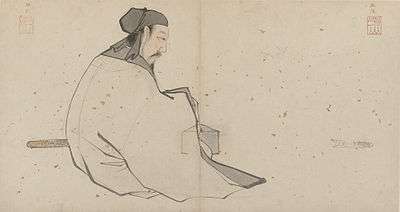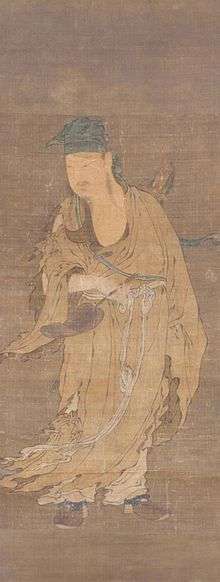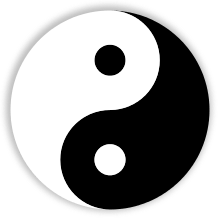Lü Dongbin

Lü Dongbin (Chinese: 呂洞賓; Wade–Giles: Lü Tung-Pin; born 796) was a Tang Dynasty Chinese scholar and poet who has been elevated to the status of an immortal in the Chinese cultural sphere, worshipped especially by the Taoists. Lü is one of the most widely known of the group of deities known as the Eight Immortals and considered by some to be the de facto leader. (The formal leader is more likely said to be Zhongli Quan or sometimes Iron-Crutch Li.) He is also a historical figure who was mentioned in the official history book History of Song. Lü is widely considered to be one of the earliest masters of the tradition of neidan, or internal alchemy. He is depicted in art as being dressed as a scholar and he often bears a sword on his back that dispels evil spirits.
Character
Lü Dongbin is usually portrayed as a scholarly, clever man with a genuine desire to help people obtain wisdom/enlightenment and to learn the Tao. However, he is often portrayed as having some character "flaws", not an uncommon theme for the colorful Taoist immortals, all of whom in general have various eccentricities:
- He is said to be a ladies man, even after (or only after) becoming an immortal – and for this reason he is generally not invoked by people with romantic problems. This may also relate to some of the Taoist sexual arts.
- He is portrayed as having bouts of drunkenness, which was not uncommon among the often fun-loving Eight Immortals. This also parallels several Taoist artists renowned for their love of drinking.
- One story relates that early on after becoming immortal, he had a strong temper as a "young" immortal, even deforming a riverbank in a bout of anger.
- Lü was also a prolific poet. His works were collected in the Quan Tangshi (Complete Tang poetry).
Early life
His name is Lü Yán, with Yán (巖 or 岩 or 喦) being the given name. Dòngbīn is his courtesy name. He is called Master Pure-Yang (純陽子 Chunyang Zi), and is also called Lü the Progenitor (呂祖 lü zŭ) by some Daoist, especially those of the Quanzhen School. He was born in Jingzhao Prefecture (京兆府 Jīngzhào Fŭ) around 796 CE during the Tang Dynasty.
When he was born, a fragrance allegedly filled the room. His birthday is said to be on the fourteenth day of the fourth month of the Chinese calendar. He had been very intelligent since childhood and had many academic achievements. However, according to one story, still unmarried by the age of 20, Lü twice took the top-level civil service exam to become a government official, but did not succeed.
Yellow Millet Dream
The legend has it that one night when Lü Yan was in Chang'an or Handan, he dozed off as his yellow millet was cooking in a hotel. He dreamed that he took the imperial exam and excelled, and thus was awarded a prestigious office and soon promoted to the position of vice minister (侍郎 shìláng). He then married the daughter of a prosperous household and had a son and a daughter. He was promoted again and again, and finally became the prime minister. However, his success and luck attracted jealousy of others, so he was accused of crimes that caused him to lose his office. His wife then betrayed him, his children were killed by bandits, and he lost all his wealth. As he was dying on the street in the dream, he woke up.
Although in the dream, eighteen years had passed, the whole dream actually happened in the time it took his millet to cook. The characters from his dream were actually played by Zhongli Quan in order to make him realize that one should not put too much importance on transient glory and success. As a result, Lü went with Zhongli to discover and cultivate the Tao. This dream is known as "Dream of the Yellow Millet" (黃粱夢 Huáng Liáng Mèng) and is described in a writing compiled by Ma Zhiyuan of the Yuan Dynasty.
In volume 82 of Song Dynasty scholar Li Fang's Extensive Records of the Taiping Era, an earlier version of the story, Lü Dongbin was replaced by Student Lu (盧生 Lú Shēng), and Zhongli Quan by Elder Lü (呂翁 Lǚ Wēng).
The exact age of Lü Yan when this incident occurred varies in the tellings, from 20 years of age to 40.
Ten trials of Lü Dongbin

A story has it that when in Chang An, Lü was tested by Zhongli Quan ten times before Quan took him in as a disciple and Lü subsequently became immortal. These ten trials are described below.
- One day Lü came back from work and found out that his loved one was dying; without sadness or remorse, he started to prepare the dress and coffin necessary for burial, but later his loved one revived and lived on. Lü was still without sadness or joyous feeling.
- Lü was selling goods at a market and there came a buyer to bargain with him. After agreeing on the price, Lü handed him the stuff but the buyer refused to pay in full and then walked away. Lü would not argue and let him walk away.
- On the first day of the lunar calendar, Lü met with a beggar. After giving him some money, the beggar kept asking for more and threw vulgar words at him. Lü left the scene with a smile.
- Lü was once a shepherd. During his tenure a hungry tiger was eyeing the goats under his care. Lü protected the goats by sending them down to the hillside and stood in front of the Tiger. The hungry tiger was awed to see this and left without hurting Lü.
- Lü was studying at a small hut on a mountain when a beautiful woman came by and asked if she could stay there for the night since she was lost. That night, this beautiful lady was flirted and tried to get Lü to have sex with her, but Lü was untouched by such temptation.
- One day Lü came back to his house and saw that he had been burglarized and lost all his belongings. Without becoming angry he started to work on his farm. As he dug into the ground he found countless pieces of gold. He uncovered the earth without taking a single piece of the gold.
- Lü bought some bronze utensils at a market. Upon returning home he realized that all of the utensils were made of gold and he immediately returned them to the seller.
- A crazy Taoist was selling medicine on the street, telling people that his magic potion would have one of two outcomes: either 1) the drinker would die on the spot, or 2) the drinker would become immortal. No one would dare to try, except Lü, who bought and tried the potion. Nothing happened to him.
- A river was elevated due to heavy rain. Lü and other passengers were on a boat crossing the river. Before reaching the middle of the journey, the weather deteriorated, and most of the passengers except Lü became worried. Lü took it in his stride and never worried about life and death!
- Lü was alone at home and suddenly weird things happened. Ghost and monsters were killing each other and wanted to do the same to Lü. Showing no sense of fear, Lü kept on doing his chores without paying attention to them. Another group of devils with blood all over them tried to take Lü’s life away by saying to Lü that he owed his previous life to them since in past life Lü took his life. Without any fear Lü said ‘go ahead and take my life since I took yours in past life, this is fair and square !’ All of a sudden the sky turned blue and those ghost and devils disappeared. Zhongli Quan (Who happened to be his Teacher and Mentor in Taoist stories) was looking and laughing at him while all these events were happening.
These 10 tests proved that Lü was a pure and dignified person and Master Zhongli was very satisfied and happy to take Lü to Nan San Her Ling to pass his secret to life and subsequently formed a "Zhong-Lü Golden Dan" school of Taoism. But Lü was not too fond of the secret and instead changed his formula for inner peace and benefits more human beings; many until today practiced such path to immortals. This is his major effort and contribution. He is said to have helped many to walk the right path and improve the health and living conditions of many people.
Stories and legends

Since the Northern Song Dynasty, there have been many stories and legends that are connected to Lü Dongbin. The stories were usually about Lü helping others to learn the Tao. According to the official History of the Song Dynasty (《宋史》), Lü was seen several times visiting the house of Chen Tuan (陳摶), who was believed to be the first person to present to the public the Taijitu.
The kindness of Lü Dongbin is demonstrated in the Chinese proverb "dog bites Lü Dongbin" (狗咬呂洞賓 gŏu yăo Lǚ Dòngbīn), which means an inability to recognize goodness and repay kindness with vice. Some say that the original proverb should actually be "狗咬呂洞賓,不識好人心," stemming from a story about the friendship between Gou Miao (狗咬) and Lü Dongbin, who both did for the other great favors, each of which seemed like a disservice initially, signifying the importance of having faith in one's friends.
According to Richard Wilhelm, Lü was the founder of the School of the Golden Elixir of Life (Jin Dan Jiao), and originator of the material presented in the book "Tai Yi Jin Hua Zong Zhi" (《太一金華宗旨》), or The Secret of the Golden Flower. Also, according to Daoist legend, he is the founder of the internal martial arts style called "Eight Immortals Sword" (八仙剑), considered to be one of the martial treasures of Wudangshan.
According to one story, Lü's teacher Zhongli Quan became an immortal and was about to fly to heaven, while saying to Lü that if he kept practicing the Tao he would also be able to fly to heaven himself very soon. Lü Dongbin replied to his teacher that he'll fly to heaven only after he enlightens all the sentient beings on earth (another story says all his relatives). According to the book "The Eight Immortals Achieving the Tao (《八仙得道摶》)," in his previous incarnation, Lü Dongbin was a Taoist master and the teacher of Zhongli Quan.
According to the Taoist book "History of the Immortals" (《歷代神仙通鑒》), Lü is the reincarnation of the ancient Sage-King "Huang-Tan-Shi" (皇覃氏).
According to Venerable Hsuan Hua, Lü is one of the transformations of Guanyin (Avalokiteśvara) Bodhisattva.[1]
Lü Dongbin and White Peony (Bai Mudan)
One of most popular of Lü Dongbin's legends is his encounter with a prostitute named White Peony (Bai Mudan)
The most popular version comes from the Journey to the East novel.[2] It is said that the immortal Lü Dongbin was greatly attracted to one of Luo Yang's most beautiful courtesans, White Peony. Lü Dongbin slept with her many times but never ejaculated, because he didn’t want to lose his Yang essence. Unfortunately Lu’s immortal colleague Iron-Crutch Li and He Xiangu taught Mudan how to make him ejaculate by tickling his groin. Finally White Peony successfully made Lü Dongbin ejaculate and absorbed his Yang essence. Later she cultivated herself and became immortal too.
Another version comes from Ba Xian Dedao novel.[3] This version is more subtle and there is no sexual intercourse here. One day the immortal Lü Dongbin transforms himself into a handsome scholar and tries to advise the famous prostitute White Peony. In their first encounter White Peony seduces him passionately, but he refuses to sleep with her. In their second encounter, Lü agrees to sleep with her. But as they walk to the bed, Lü suddenly cries that his stomach is painful, and faints. White Peony is very sorry about his condition and calls a doctor using her money (despite her pimp’s grumbling, who incites her to throw the sick Lü to the road). Lü (who is only pretending to be sick) is very pleased knowing Peony's merciful heart. In their third encounter, Lü Dongbin finally succeeds to persuade White Peony to leave her wayward life. She finally becomes immortal too.
In the opera version, White Peony is changed from a seductive prostitute to the daughter of a drugstore owner. One day Lü Dongbin comes to their store and makes trouble by asking for impossible medicines. Knowing her father's difficulty, Peony meets Lü and answers all of his question. From quarrelling they finally become lovers.
Modern worship
In 19th- and 20th-century Guangdong, belief in the powers of Lüzu was strong. In the century after the 1840s, temples were founded which organized spirit writing seances, festivals for the birthdays of the gods, death rituals, and running schools, clinics, and disaster relief.[4]
Media depictions
In the television show Jackie Chan Adventures, Dongbin was shown to be the immortal who sealed away Shendu, The Fire Demon.
Jackie Chan portrayed Lü Dongbin in the film The Forbidden Kingdom.
In Desolate Era, Lü Dongbin is portrayed as one of the True Yang Immortals.
See also
![]() Media related to Lǚ Dòngbīn at Wikimedia Commons
Media related to Lǚ Dòngbīn at Wikimedia Commons
- The Ten Trials of Patriarch Lu Dongbin as translated by Abbot of Five Immortals Temple
References
- ↑ 金剛菩提海圖像版 Vajra Bodhi Sea, vbs 300
- ↑ Wu Yuantai. Journey to the East (Dong You Ji)-Chinese text
- ↑ Ba Xian Dedao (Eight Immortal obtain enlightenment) Chinese text
- ↑ Shiga Ichiko, "Manifestations of Lüzu in Modern Guangdong: The Rise and Growth of Spirit Writing Cults," in Livia Kohn, Harold David Roth, ed., Daoist Identity: Cosmology, Lineage, and Ritual (Honolulu: University of Hawai'i Press, 2002 ISBN 0585464049), p. 200.
External links
- Bai Zi Bei: The Hundred Character Tablet, a short classic on meditation and immortality attributed to Lü Dongbin
- A Prostitute Who Became a Deity. Translated by Nathaniel Hu A legend about Lu Dongbin's attempts to convert a lewd prostitute named Bai Mudan (White Peony) from her wayward live
